If you've visited either my MySpace or Facebook profiles lately, you've seen my new (old) default pic, featuring an awesome version of a 'stache, all over my face! Check it out!:
But ...it's kind-of a lie! This is an old picture, from the last time I "grew" out my mustache a couple years ago.
Anyway, just wanted to let you know that I'm "growing" it again, and I'll post new pics when it looks good enough (never)!
23 August, 2008
Mustache Update!
10 August, 2008
My Favorite Part of the Opening Ceremony Was...
Spider Guts All Over My Finger! Gross!!
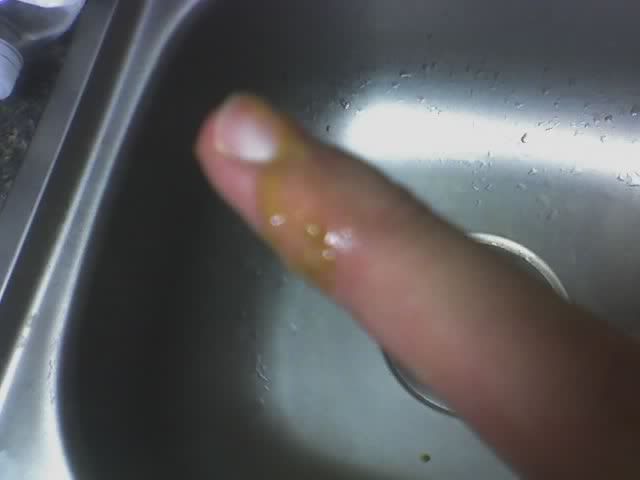 I like bugs. I do not, however, like poisonous black widow spiders living underneath my patio furniture. When this happens, I like to introduce these widow spiders to a friend of mine: the hammer. (And that's not a nickname for something. I really just mean a big ol' hammer.)
I like bugs. I do not, however, like poisonous black widow spiders living underneath my patio furniture. When this happens, I like to introduce these widow spiders to a friend of mine: the hammer. (And that's not a nickname for something. I really just mean a big ol' hammer.)
This evening, one particularly meaty spider decided, for whatever reason, that she was intent on doing as much harm to me (sans biting) as she could, and in her last, vain attempt at vengeance--at the moment of hammer-to-spider impact--she sprayed her disgusting insides all over my finger. It was gross. Really, really gross.
I guess that'll teach me.
04 August, 2008
'The X-Files: I Want To Believe' - Review
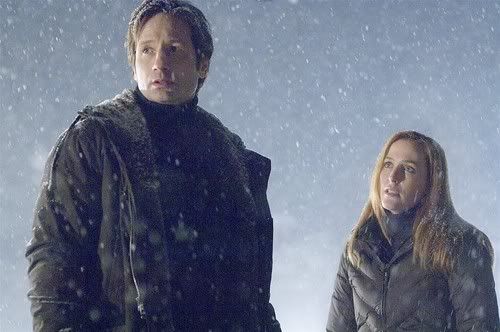 It’s like I Want To Believe is the most mature episode of The X-Files never aired. That’s not necessarily a knock at the long-running show—which, in it’s day, was the kookiest, scariest, most mystifying(ly good) series on TV. After all, the show was, by it’s nature, irrational, improbable, and occasionally naïve—thrilled by the possibility of truth within (normally) unbelievable situations. But time has passed, and while I won’t argue that the world is a categorically different place than it was in 2002 (when The X-Files went off the air), it seems more than appropriate that former FBI Agents Mulder and Scully have adapted to a new status quo. In I Want To Believe, it’s like Mulder and Scully grew up, and went from being characters on a sci-fi TV show to being real people with real dilemmas …who occasionally dabble in the supernatural.
It’s like I Want To Believe is the most mature episode of The X-Files never aired. That’s not necessarily a knock at the long-running show—which, in it’s day, was the kookiest, scariest, most mystifying(ly good) series on TV. After all, the show was, by it’s nature, irrational, improbable, and occasionally naïve—thrilled by the possibility of truth within (normally) unbelievable situations. But time has passed, and while I won’t argue that the world is a categorically different place than it was in 2002 (when The X-Files went off the air), it seems more than appropriate that former FBI Agents Mulder and Scully have adapted to a new status quo. In I Want To Believe, it’s like Mulder and Scully grew up, and went from being characters on a sci-fi TV show to being real people with real dilemmas …who occasionally dabble in the supernatural.
The fundamental theme at the heart of The X-Files (both the series and this new movie) is the search for truth, and it’s relationship to faith. As always, both Mulder and Scully have their own personal faiths, as well as their doubts. Scully, who is now working as a doctor in a Catholic hospital, is treating a boy whose illness requires painful and extremely experimental treatments for any chance of survival. The way this compelling subplot weaves into the main story of the priest and the missing agent is mostly based on overlapping themes, but it also expertly fleshes out Scully’s complex response to the case, and her feeling towards Mulder’s involvement in it.
'The Dark Knight' - Review And/Or Diatribe
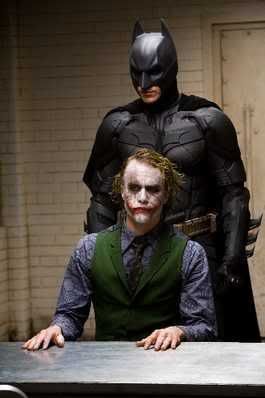 [Shrugs shoulders]
[Shrugs shoulders]
It was okay.
And that’s fine, I guess. You could argue that that makes him a good villain, and I would, of course, understand your point. He’s mesmerizing, in a way. In his speech in the hospital, to the newly two-faced Harvey, the Joker talks about hating “schemers” and their “plans.” He says, “If I tell the press that tomorrow … a truckload of soldiers will get blown up, nobody panics”—because deaths like these have become part of the status quo. There is an allure to what he says, because it sounds tragic and unjust. His argument is tantalizing, and what he says quickly starts sounding like…truth. And, neatly, this line of reasoning by the Joker—who is tarted up in a candy striper’s uniform (okay, acquiring that costume must’ve required some sort of forethought and planning, right, Mr. J?)—inflames Harvey so much that he concludes that the system is at fault for it’s own corruption. His own corruption. That the ‘system’ allowed the Joker to kill Rachel. The ‘system,’ as represented by Batman, and Lt. Gordon, and Harvey himself. Interestingly, this message is echoed by another character later in the movie: “You crossed the line first, sir. You squeezed them, you hammered them to the point of desperation. And in their desperation they turned to a man they didn’t fully understand,” argues Alfred to a disenfranchised Batman. Somehow, it seems, the Joker has convinced us that he is the hero of Gotham City, and maybe of The Dark Knight—or, at the very least, that he is a necessary, and perhaps even innate, evil.
The problem is, I don't know if I believe what that last sentence implies (that there can be no order without chaos, or that you have to break the rules to succeed). I could go on and on about my complicated response to Heath Ledger's Joker, and, accordingly, The Dark Knight itself (because, after all, isn't so much of The Dark Knight's success linked to the Joker?). But just understand this: in a twisted, ironic way, I like the movie less because it's so damn popular. I don't want to sound snobbish or out-of-touch, but why are people so damned passionate about such a demented, terrible, perverted killer? What does it mean when 6-year-old kids are playfully asking if their friends want to know how they got these scars?, or that you can "Become a Fan of" The Joker on Facebook? Why is this movie, and particularly this character, striking such a nerve, especially with young people? The more I think about it, the more frustrated I get. Are we all just closeted nihilists and anarchists? What does it mean if we are? so I'll stop.
Sigh. I don’t know. If I stop all this analyzing (or, you might easily argue, over-analyzing), then I’m afraid I’ll feel the opposite effect from what you’d expect: I’d like The Dark Knight less. It’s made with master craftsmanship, and it looks and sounds fantastic. When all the gears are aligned, it hums along with a satisfying briskness and ingenuity. But, it’s just…well, I like my big budget movies to be a little bit more than mindless, populist crowd-pleasers, packed with as many explosions, gadgets, and one-liners as the focus groups found appropriate. I like it when my movies think. So I understand that the Joker, as a character, was carefully constructed by Chris Nolan, his co-writers, and especially Heath Ledger, to arouse certain responses, and that it was an intentional choice to keep his origins elusive and his underlying motivations murky. I just don’t think I responded all that favorably to their creation. Maybe I just don’t like chaos.
But at least I can take a little comfort in one thought: With The Dark Knight grossing in excess of $400 million, following one of the most carefully planned marketing schemes in Hollywood history—for a Warner Bros. release that was meant to be the studio's (a subsidiary of Time Warner Inc., by the way) biggest summer tentpole release, no less—it's refreshingly ironic to think that as we passively participate in the status quo in such a ‘meta’ way, the Joker would be sitting back and laughing at us all?
01 August, 2008
The Pussycat Dolls Need To Enunciate Better
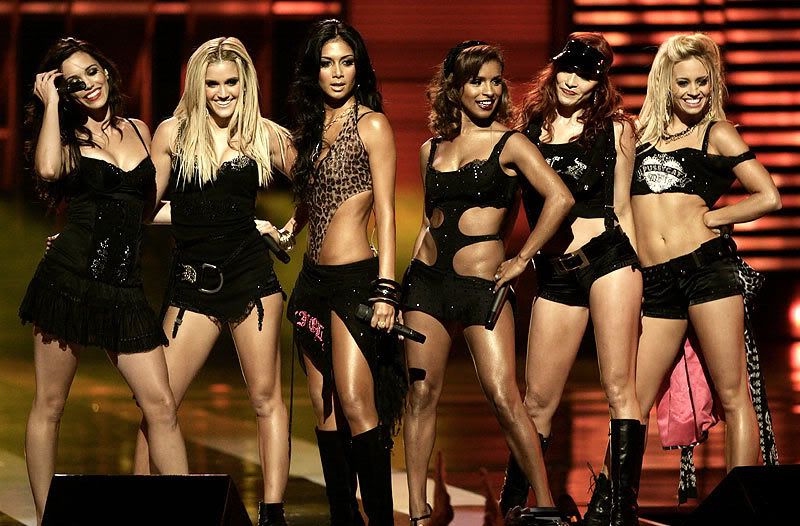
"When I grow up
I wanna be famous
I wanna be a star
I wanna be in movies
When I grow up
I wanna see the world
Drive nice cars
I wanna have boobies"
...Anyone?
Considering what we know about the Pussycat Dolls, I think it's safe to assume that the final lyric is probably about desiring "groupies," and not "boobies."
However, I haven't ruled out that the song ("When I Grow Up") isn't meant to be some sort of empowering anthem aimed at young girls--who, as conceived in the minds of record producers, may, indeed, be desirous of boobies.
After hearing one of PCD's earlier singles ("Buttons"), I mistook the lyric "I'm telling you to loosen up my buttons baby" for "I'm telling you to loosen up my butt [uh] baby" (that's the word "butt" followed by a vague, sexual grunt). At the time, I reflected that this would be a strange thing to sing, but perhaps it was in reference to getting loose and booty-shaking on the dance floor, or at least that's what I hoped, because to loosen up a butt sounds, frankly, diarhettic.
Does anyone else have these kinds of mishearing problems? Do you blame me or the Pussycat Dolls for dirtying up their lyrics (although 'loosening up her buttons...in order to take her pants off' is, you know, already fairly dirty)? And why do I not hate the Pussycat Dolls more than I do?
30 July, 2008
New Trailer! - 'Harry Potter and the Half-Blood Prince'
 The new movie trailer for the series' sixth installment can be viewed on Moviefone.
The new movie trailer for the series' sixth installment can be viewed on Moviefone.
All I can say is: YESSSSSSSSS!
The pensieve flashback, with Dumbledore visiting a young (and definitely creepy) Tom Riddle at the orphanage, is exciting stuff. And seeing Ron and Ginny in various states of, what appears to be, immediate and life-threatening danger is chillingly good. It would have been nice to see some Snape or even some Draco, but for a brief teaser, it's almost better this way.
Siskel and Ebert and Roeper and Others and the Movies
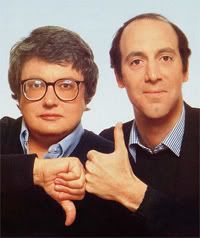 Roger Ebert is one of the most brilliant writers I've read, and that's no joke. He is, of course, my favorite movie critic (although I'll be the first to admit his writing suffered during his health battles). He is a man who is both fiercely intelligent and absolutely genuine. Roger recently wrote a journal entry (appropriately titled "The balcony is closed") about the history of his television show and specific recollections surrounding it's successes, in response to the news of it's producers taking it in a "new direction."
Roger Ebert is one of the most brilliant writers I've read, and that's no joke. He is, of course, my favorite movie critic (although I'll be the first to admit his writing suffered during his health battles). He is a man who is both fiercely intelligent and absolutely genuine. Roger recently wrote a journal entry (appropriately titled "The balcony is closed") about the history of his television show and specific recollections surrounding it's successes, in response to the news of it's producers taking it in a "new direction."
In that article, Roger posted a couple YouTube videos of some promo outtakes with himself and Gene Siskel. These guys are pretty awesome.
21 July, 2008
Box Label
I'm moving, so I've got a lot of packed boxes. I have one small box, labeled, simply, for it's miscellaneous and unrelated contents:
"Pogs, Wigs, Viking Helmets."
That is all.
20 July, 2008
Bug-Inspired Poetry
These two poems were written awhile back, set in motion by an encounter with a live scorpion inside my friend's house. Their current posting, however, was inspired by a litter of baby praying mantises (mantisi?), crawling, adorably, around my mom's front porch. They are the cutest thing!
It's my first attempt at poetry! How novel!
Untitled ("Mona Lisa never swatted a fly, so far as I know." ?)
Mona Lisa never swatted a fly, so far as I know.
Her hands are--of course--too virtuous
(notice the absence of a wedding band!)
to be soiled by the guts of a hairy shit-eater.
But did she ever have a picnic ruined
by a swarm of bees or ants or locusts?
Were her delicate, enigmatic features
ever contorted in disgust or anger or flippancy
by her accidental penetration of a lacy spiderweb?
Could she ever have been put at peace
by the gentleness of a butterfly or the incongruity
of a caterpillar's breached cocoon?
To show her these things now would be an insult,
of course, to beauty, to her, and to the bug.
Still-life, With Obstruction
When he spotted the spider, nimbly crawling
Over the apricot, the painter had a choice:
Preserve the integrity of the moment
And include the wayward creature
On the canvas, among the stationary fruits,
Inviting critics to establish it's meaning
Beyond the magic of it's arbitrariness,
Or admit the impermanence of it's passing
And excise it's cursory, scrambling self
From the art of inanimation.
He was ensnared, he thought, aptly.
Well, what did you think? Were they okay? Were they lousy and amateurish? What's up with the weird connections to art & painting? Did you get lost in all the unnecessarily indulgent "thesaurus" words? (Don't be afraid to say you didn't "get" it. It's not your fault.) Do you love (and, simultaneously, loathe) bugs as much as I do? Do you have any suggestions for improvement?





